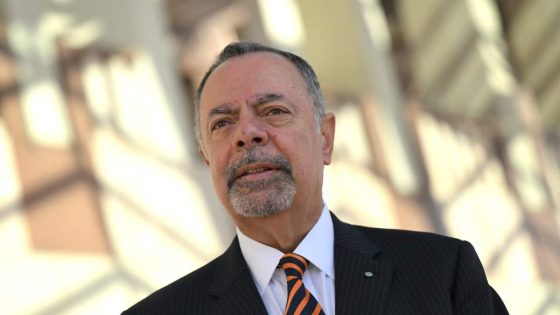Key Points
- The final report of the Royal Commission into Defence and Veteran Suicide was tabled on Monday afternoon.
- The number of deaths by suicide among those who serve or have served in the ADF is “unacceptably high”, the report says.
- The seven-volume report makes 122 recommendations.
This article contains references to suicide, along with sexual violence.
After three years, thousands of submissions and hearing from hundreds of witnesses, an inquiry into the “national crisis” of suicide among serving and ex-serving members of the Australian Defence Force (ADF) has been handed down.
The final report of the Royal Commission into Defence and Veteran Suicide was tabled by Defence Minister Richard Marles and made public on Monday afternoon, as its chair called for a “line in the sand”.
Decades in the making, the inquiry found numerous institutional drivers within Defence and the Department of Veterans’ Affairs (DVA) contribute to “persistently high” rates of suicide and suicidality.
The seven-volume report makes 122 recommendations, including setting up a new agency focused on veteran wellbeing, and says culture and leadership within Defence needs to change.
The report also called on the government to commission an external, independent inquiry into military sexual violence in the ADF.
Deputy Prime Minister Richard Marles tables the report from the Royal Commission into Defence and Veterans Suicide in Canberra. Source: AAP / Mick Tsikas
“As Commissioners, we insist that it is both necessary and possible to reduce the number of deaths by suicide and experiences of suicidality among serving and ex-serving ADF members,” Commissioners Nick Kaldas, James Douglas and Peggy Brown wrote in the report foreword.
“Our sailors, soldiers and aviators deserve to receive the protection and support they need to thrive, grow and heal, both during their time in service and beyond.”
Number of deaths by suicide ‘unacceptably high’
The number of deaths by suicide among those who serve or have served in the ADF is “unacceptably high”, the report says.
Between 1 January 1985 and 31 December 2021, there were 2,007 confirmed suicide deaths of individuals who had served at least one day in the force since 1 January 1985.
An average of 78 serving or ex-serving ADF members have died by suicide each year for the past 10 years, which equates to an average of three deaths every fortnight, the report says.
“As large as these numbers are, they underestimate the scale of the problem.”
The report outlines how the rate of suicide among both serving and ex-serving members has persisted over time, noting risk factors for suicide and suicidality in a military context are “extremely complex”.
The three-year inquiry, , received almost 6,000 written submissions from serving and ex-serving ADF members, and their families, carers and advocates, as well as organisations and institutions.
It heard from more than 340 witnesses at public hearings — including the most senior leaders of the ADF, Ministers for Defence and Veterans’ Affairs (DVA) — and held almost 900 private sessions.
“We will remain forever changed by the personal stories shared by serving and ex-serving ADF members and their families, friends and supporters. Your contributions shaped our inquiry, and this final report was written with you in mind,” the Commissioners wrote.
“We are inspired by your resilience, courage, and desire to change things for the better so that others do not experience what you have endured.”
Speaking in parliament on Monday as he tabled the report, Marles thanked “all of those who were brave enough to contribute to the inquiry”.
He spoke directly to Julie-Ann Finney, , who died by suicide in 2019 after a two-decade career with the Royal Australian Navy.
Julie-Ann Finney holds a photo of her late son David at a rally to protest veteran suicide outside Parliament House. Source: AAP / Mick Tsikas
“I know, and the prime minister knows, and I am aware that so many across this parliament know, that this report would not be tabled today but for Julie-Ann’s advocacy,” Marles said.
“I want to say to Julie-Ann that this report is for David. It is for David and the many others like him who have worn our nation’s uniform.”
Many of the report’s 122 recommendations are aimed at preventing harm and supporting early intervention and recovery, improving delivery and access to support services, along with transparency and accountability across those institutions and agencies who are responsible for the health and well-being of ADF members and their families.
Culture and leadership within the ADF
The report examines issues associated with culture and leadership within the Defence force, with the inquiry hearing accounts of bullying, harassment, discrimination, misogyny and physical and sexual violence experienced during training or throughout service life.
In submissions, current and former ADF members described having been “belittled, verbally abused, and ostracised by their peers”, while others were targeted for harassment based on their race, gender identity or sexual orientation.
It also received numerous accounts of senior officers abusing power, the report says. Many members did not report their experience.
The report said Defence’s initiatives to reform its culture have suffered from “systemic problems” including failure to articulate known cultural issues that require attention, and a lack of clear and measurable targets.
The report recommended ADF chiefs should agree on a suite of culture targets that prioritise safety, health and wellbeing, with an annual culture report that is publicly available. It should also consider emotional intelligence and performance against wellbeing targets in selecting leaders to promote.
Military sexual violence
The commission found that while both women and men experienced military sexual assault, it is disproportionately experienced and reported by women.
Data from Defence on victims and alleged perpetrators of sexual misconduct from 1 January 2018 to 1 October 2023 found over 80 per cent of victims were female, and over 90 per cent of alleged perpetrators were male.
The report called on the government to commission an external, independent inquiry into the issue in the ADF. The terms of reference for such an inquiry would be developed in consultation with victims of sexual violence in the ADF, would include recommendations, and be made public.
It also recommended that Defence members who are convicted of sexual and related offences (including stalking and intimate image abuse) should be subject to a mandatory discharge.
As a matter of urgency, the government should ensure the ADF has a complete and reliable record of all serving members who have been convicted of such an offence in civilian courts, the report said.
Veterans’ wellbeing and transition to civilian life
In the final report, the Commissioners called for the set up of a new executive agency focused on veteran wellbeing that would be nested within the DVA.
It would focus on supporting veterans to transition from military to civilian life, navigate the wellbeing ecosystem and improve referral pathways at a systems level.
The report also recommends expanded transition screening programs to assess the psychological readiness of Defence members, and a DVA-funded cultural transition program to support them during the process.
The report also called for a national funding agreement on veterans’ wellbeing, along with the establishment of a national peak body for ex-service organisations.
From left to right: Governor-General Sam Mostyn receives the final report of the Royal Commission into Defence and Veterans Suicide from Chair Nick Kaldas and Commissioners Peggy Brown and James Douglas. Source: AAP / Lukas Coch
Data monitoring and reporting
The report recommends developing a new database to monitor suicide deaths of serving and ex-serving Defence members.
It calls on Defence and the DVA to conduct and publish research that includes information on health and wellbeing, while also setting up an expert committee on veteran research.
The report recommends directing the Australian Bureau of Statistics (ABS) to include an additional question on “year of separation” for ex-serving members in the 2026 Census, while continuing to include an existing question on ADF service.
‘I’d say that’s a failure of leadership’
The Commissioners have previously said the inquiry had identified at least 57 previous inquiries or reviews relating to Defence and veteran suicide over the last 20 or 30 years, which resulted in some 770 recommendations for change.
Speaking to the media ahead of the report’s release on Monday, Kaldas said the inquiry had heard many had “turned a blind eye”, claiming leadership had failed.
“There have been dozens of inquiries and hundreds of recommendations, and no one has gone back to check whether they’ve acquitted the intent of the recommendations,” he said.
“I’d say that’s a failure in leadership.
“What is clear from some of the horrible stories that we’ve heard is that many people simply turned a blind eye over many years, and felt it was too hard, or they simply didn’t care enough to tackle the problems.”
He said the royal commission has ensured that “the problems are now perfectly clear and they are undeniable”.
“We hope that that is taken on board and that there’s a line in the sand.
“This should be a call to action once and for all. The men and women in the [Australian] Defence Force have worn the uniform, they’ve done everything we’ve asked. Often, many of them have gone into harm’s way, and we owe it to them to do the right thing.”
Marles said the government “is committed to responding to this report shortly”.
“Just as our veterans and defence personnel step up for our country, we have an obligation to step up for them,” Prime Minister Anthony Albanese told parliament.
“The government will thoroughly consider every recommendation.”
Readers seeking support can contact Lifeline crisis support on 13 11 14, Suicide Call Back Service on 1300 659 467 and Soldier On Australia on 1300 620 380.
If you or someone you know is impacted by family and domestic violence, call 1800RESPECT on 1800 737 732, text 0458 737 732, or visit . In an emergency, call 000.
, operated by No to Violence, can be contacted on 1300 766 491.




